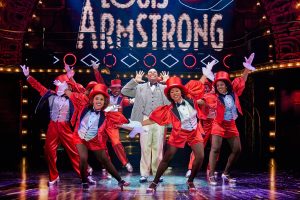
In a busy autumn on Broadway, here are a few of the better offerings to meet a variety of tastes:
Maybe Happy Ending – On a Broadway landscape filled with movie adaptations and celebrity biographies, a genuinely original musical — from Korea, no less — is bound to stand out. Factor in that it is a romantic comedy between two outdated robots in the year 2064, who didn’t know they were looking for love or even quite what love is and you have an unexpected emotional journey, exactly what a musical should aspire to deliver.
As in most rom-coms, Claire (Helen J Shen) and Oliver (Darren Criss) meet cute, when she knocks on his apartment door, eager to get a battery charge from him before her power is depleted. You see, they are both Helperbots, android assistants to their human owners, though both are now out-of-date with replacement parts scarce, living out their retirement across the hall from each other, unaware of their existence until Claire’s power emergency. And while Oliver is initially annoyed by her intrusion, he is soon curiously drawn to her with previously unrealized feelings.
Highly trusting, but not very bright Oliver has been waiting for a reunion with his master. But now, with Claire’s assistance — being a newer model bot she is able to drive — the two of then head off on a road trip of discovery and, perhaps, romance. If that sounds the least bit conventional, you haven’t got the picture at all. Their journey — all imaginatively realized by scenic designer Dane Laffrey and director Michael Arden — takes them to a distant Korean island by ferry boat, to an overnight stay at a Motel Sexx and, most magically, to a forest illuminated by fireflies.
Criss (best known for TV’s Glee, but with plenty of stage credits) is entirely committed to his robot persona, which involves mechanical movements that he manages to make endearing. Shen, in her Broadway debut, is every bit as appealing, and together they conjure a palpable chemistry albeit of a robotic kind. Both are strong vocalists, rendering well the score by Hue Park and Will Aronson, which while melodic, is entirely absent of the bombast that has taken hold of the musical theater by the throat. Criss and Shen handle most of the singing chores, but Dez Duron appears on occasion as the voice of the retro jazz albums to which Oliver has grown fond.
The totality of Maybe Happy Ending is as unlikely as it is intoxicating. Where the ride leads should be left for the viewer to discover, but it is after all a rom-com, with the genre’s expectations intact.
MAYBE HAPPY ENDING, Belasco Theatre, 111 W. 44th St., $59-$311. 212-239-6200.

Death Becomes Her — The problem with too many musical comedies is that they really aren’t very funny. Then there are shows like the newly minted Death Becomes Her, a laugh-a-minute stage adaptation of the 1992 Meryl Streep-Goldie Hawn egofest flick, dusted off and actually improved in its new, pardon the expression, incarnation. It would be far better if the score by Julia Mattison and Noel Carey — both making their Broadway debuts — were better than serviceable, but you can’t have everything.
As you probably recall, the story revolves around aging-but-still-kicking stage star Madeline Ashford (Megan Hilty in the Streep role), who learns of a potent concoction that not only restores her youth, but makes her immortal. For a price, of course. But first she is reunited with her longtime friend and rival, writer Helen Sharp (Jennifer Simard, taking over for Hawn), which unleashes an evening-long torrent of poisoned zingers, penned by the droll Marco Pennette (veteran of TV’s Ugly Betty and others).
The animosity and comedy level of the two women only increases exponentially when Madeline manages to steal away and marry Helen’s fiancé, plastic surgeon Ernest Menville (Christopher Sieber in the supporting role first played by Bruce Willis). Also making a welcome contribution is Michelle Williams (of Destiny’s Child) as potion pusher Viola Van Horn, who sets the show’s tone with the opening number, “If You Want Perfection.”
Tony-winning choreographer (Newsies) Christopher Gattelli steps up into the director’s chair with assurance, keeping the farcical hijinks tight and delivering live equivalents of the movie’s numerous special effects. For instance, there’s the gaping hole blown into Helen’s body, thanks to illusion designer Tim Clothier. And Madeline’s twisted head — or at least that of a body double for Hilty — following a hilarious slow-motion fall down a stage-high winding staircase. Add in a parade of dazzling sets by Derek McLane and Paul Tazewell’s cleavage-flashing costumes to make a production where no expense was apparently spared.
Yet the design elements and effects cannot upstage Hilty and Simard, a pair of vocal belters who also know how to get the most out of a laugh line. Canny producers would do well to consider other properties to team up the two of them. Until then, however, Death Becomes Her will do just fine. Perhaps not a great musical, but one that certainly entertains, probably for a long time to come.
DEATH BECOMES HER, Lunt-Fontanne Theatre, 205 W. 46th St., $79.75- $319.50. 212-239-6200.

A Wonderful World: The Louis Armstrong Musical – In building a biographical musical of legendary trumpeter Louis Armstrong, his catalog of jazz hits are a given. The more important quality, the one where other attempts at celebrating Satchmo have come up short is in the charisma of the principal performer. Fortunately, that is the strength of the current show, for it stars James Monroe Iglehart, as personable and talented as any production could want.
Iglehart is no stranger to stepping into big shoes, having wiped away our image of Robin Williams’ genie on his way to winning a Tony Award in the Disney stage adaptation of Aladdin. And from the opening moments of A Wonderful World, as Iglehart stands alone at center stage blowing into his trusty horn, he is Louis Armstrong, raspy voice and all.
The show is entirely conventional, being a chronological account of Armstrong’s life, career and legacy, although most of it will probably be new to much of the audience. Scripter Aurin Squire has divided the evening into four sections, coinciding with Armstrong’s four wives, from an expendable union with a New Orleans hooker to a more enduring marriage with a Cotton Club headliner. Each is well represented — Dionee Figgins, Jennie Harney Fleming, Kim Exum and Darlesia Cearcy — and missed when he abruptly jettisons them.
But Armstrong’s most important relationship was with his music, which remains prominent throughout the show, from lesser-known numbers as “Tiger Rag” and “Heebie Jeebies” to such inevitable inclusions as “When the Saints Go Marching In,” “Hello, Dolly” and the show’s title tune, which embodies Armstrong’s philosophy of optimism despite the racial prejudice he encountered along the way.
Without ever losing the focus on Armstrong, director Christopher Renshaw manages to widen the show’s lens to include a cast of two dozen and a remarkable tangent with Lincoln Perry, a/k/a Stepin Fetchit (DeWitt Fleming Jr.). He and Armstrong share a wary view of the white world in an ironic tap dance to “When You’re Smiling,” a standout segment of the show. Eventually, Armstrong feels the urge to speak out about the pre-civil rights era prejudices, which earns him years of blacklisting by Hollywood.
The show does darken in the second act, but much of the evening floats on Armstrong’s good-time music-making. A Wonderful World adds up to a satisfying biography and jazz fest, largely because of the larger-than-life Iglehart.
A WONDERFUL WORLD: THE LOUIS ARMSTRONG MUSICAL, Studio 54, 254 54th St., $69-$308. 212-239-6200.